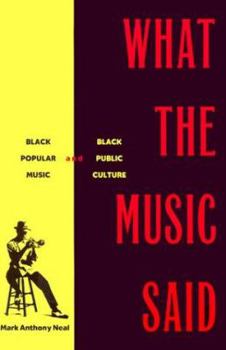What the Music Said: Black Popular Music and Black Public Culture
Select Format
Select Condition 
Book Overview
First Published in 1999. Routledge is an imprint of Taylor & Francis, an informa company.
Format:Paperback
Language:English
ISBN:0415920728
ISBN13:9780415920728
Release Date:February 1999
Publisher:Routledge
Length:216 Pages
Weight:0.80 lbs.
Dimensions:0.6" x 6.0" x 8.9"
Related Subjects
African-American Studies Art Arts, Music & Photography Communication & Journalism Communication & Media Studies Ethnic & International Media Studies Music Musical Genres Performing Arts Politics & Social Sciences Pop Culture Social Science Social Sciences Specific Demographics Textbooks Theory, Composition & PerformanceCustomer Reviews
3 ratings
Interesting Premises
Published by Thriftbooks.com User , 22 years ago
In this book Neal theorizes about African-American music, examining the link between early 20th century musics and turn-of-the-millenium music. The author shows connections between social developments and the forms of pop music that black Americans developed. The book is interesting both as a survey of some threads of black music and as an overview of historical changes for African-Amercians in our nation.The linkages between the two-- the music and the social climate-- are supported by a careful analysis of the music, and more often of the lyrics of some well-known composers. Performance styles are given some attention also. However, Neal is selective about examining only those artists whose work supports his theories. Other artists whose work does not fit the schema are generally ignored. In this sense, the book is not exhaustive. That is fine, actually, as the volume is elegantly structured into six digestible chapters. This maintains the momentum of the writing and allows the reader to remain engaged, to avoid being bogged down in minutia.Neal does a nice job of examining the African-American societies that have emerged during the 20th century. He looks at how different groups of blacks have related with each other, and how the music serves to both mollify and communicate the tensions and connections between the groups. The roles of work, finances, and community are given emphasis in his theories. As such, he focuses mostly on the middle-class, the working-class, and the under-class blacks. Other groups, such as gays or the wealthy (often the artists themselves), receive less attention.The author does at times surrender to a hair-splitting approach with the concepts. Sometimes his writing becomes entangled, with long, long sentences that are structured so that the reader becomes lost. This occurs primarily in the later chapters. The index given to the book is fairly incomplete, making cross-referencing difficult. To his great credit, Neal tends to hew closely to common language. This makes the book as a whole accessible to a variety of readers. Overall, I found this to be a educational and insightful volume, and recommend it to anyone interested in popular music, African-American cultural studies, or contemporary history.
On-Point
Published by Thriftbooks.com User , 24 years ago
Books Like This state The Facts of the Importance of Black Music not only in America but also WORLDWIDE.How it has shaped the World at Large.How The Beauty & Tragedy of The Music always keeps your Attention.Black Music Has Influenced everything Period.Rock-Roll was Taboo because it was from Blues,Jazz,Funk to Rap all have been Called Taboo because of The Negro Imput.it Plays Out on Society at Large.The Impact is so Strong that thru out History to this day you Get a Watered Down take of it.From What Little Richard had to Put up with thru Pat Boone among others to What The Jackson 5 & New Edition deal with all of these Wack Non-Singing White Boy Bands Cashing in on a Style and Not Respecting it.Jimi Hendrix took it back Home for us as did Michael Jackson.cuz all of The Styles are Ours.Miles Davis was Straight Black with it.Marvin Gaye as well.James Brown among many made Statements Heard around the World that Spoke Volumes About Us Here In The United States.
I Love this book, a must- buy for any lover of music
Published by Thriftbooks.com User , 25 years ago
I think that this book was very well written and focused very well on how the music of the Black community was a reflection of the status of blacks as well as their position. As a former student of Dr. Neal, I have learned that resistance to oppression does not always come from marches and sit-ins, but music itself can be a form of social protest. If you are a student of African-American history, you must have this book for your collection. Buy it now!






